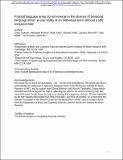Frontal language areas do not emerge in the absence of temporal language areas: A case study of an individual born without a left temporal lobe
Author(s)
Tuckute, Greta; Paunov, Alexander; Kean, Hope; Small, Hannah; Mineroff, Zachary; Blank, Idan; Fedorenko, Evelina; ... Show more Show less
DownloadSubmitted version (1.150Mb)
Publisher with Creative Commons License
Publisher with Creative Commons License
Creative Commons Attribution
Terms of use
Metadata
Show full item recordAbstract
Language processing relies on a left-lateralized fronto-temporal brain network. How this network emerges ontogenetically remains debated. We asked whether frontal language areas emerge in the absence of temporal language areas through a 'deep-data' investigation of an individual (EG) born without her left temporal lobe. Using fMRI methods that have been validated to elicit reliable individual-level responses, we find that-as expected for early left-hemisphere damage-EG has a fully functional language network in her right hemisphere (comparable to the LH network in n = 145 controls) and intact linguistic abilities. However, we detect no response to language in EG's left frontal lobe (replicated across two sessions, 3 years apart). Another network-the multiple demand network-is robustly present in frontal lobes bilaterally, suggesting that EG's left frontal cortex can support non-linguistic cognition. The existence of temporal language areas therefore appears to be a prerequisite for the emergence of the frontal language areas.
Date issued
2022Department
Massachusetts Institute of Technology. Department of Brain and Cognitive SciencesJournal
Neuropsychologia
Publisher
Elsevier BV
Citation
Tuckute, Greta, Paunov, Alexander, Kean, Hope, Small, Hannah, Mineroff, Zachary et al. 2022. "Frontal language areas do not emerge in the absence of temporal language areas: A case study of an individual born without a left temporal lobe." Neuropsychologia, 169.
Version: Original manuscript